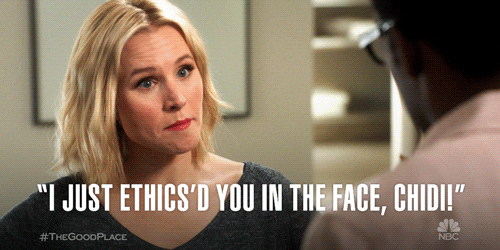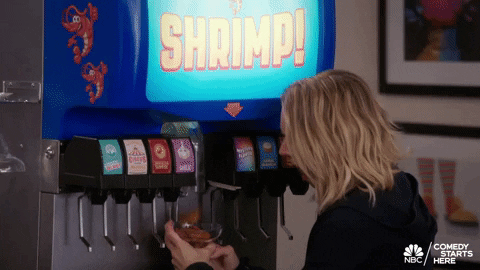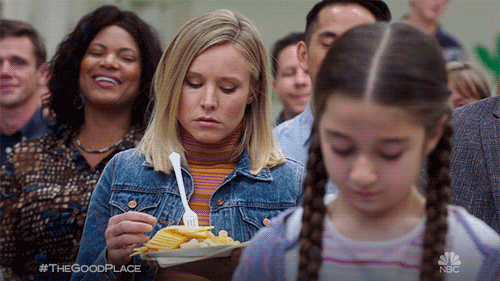Shake Shack and the business of ethics
The burger chain may talk about values, but do they have a place in the conversation if it's not driving the bottom line?
Over the last two months, it feels as though we’ve come to a head with the food establishments that made ethics core to their go-to-market messaging. The big three that come to mind for me are: Eleven Madison Park on the ethics of waste and meat; Blue Hill and Stone Barns on the ethics of sustainability; and Shake Shack on the ethics of “being good”.
Where toxic kitchen culture, labour practices, and management personalities come to the fore to mar the pristine images put forth by Eleven Madison Park and Blue Hill, Shake Shack finds its ambitious and overarching ethics code at odds with the private political donations by and views of the Martin family. Yes, we’re talking about the Martin family that owns and operates Martin’s Famous Pastry Shoppe (maker of the popular potato rolls), and who support GOP Senator Doug Mastriano in his bid for Pennsylvania governorship.
I’ve spent much of July considering what I want to add to the conversation. Many have been quick to point to Shake Shack’s values page, but I need to underscore the fact that the commodification and packaging of ethics has always been just that—the tangible community good being a byproduct. The economic equation has always remained paramount, even when it comes into direct conflict with the values that Shake Shack espouses in its marketing.
So, let’s talk about it.
Why the uproar in the first place?
Along with all the burgers and milkshakes that Shake Shack sells on a daily basis, the New York-based company has also made sure to consistently sell its ethos of “doing good”. The association of Shake Shack’s brand positioning with the warm fuzzies has ramped up in recent years with press communications and annual reports, creating an intertwined connection between “good” and the company itself.
The causes that Shake Shack supports includes: the LGBTQ community; animal welfare practices; racial diversity; environmental initiatives; and other underserved populations.
To purchase a burger, or even one of the charity-driven items, is to implicitly buy into the idea of being good. And these ingestible culture bites have been a long time in the making. Even Shake Shack’s early years, the company went so far as to register the service mark for Stand for Something Good® with the US Patent and Trademark Office.
The company prides itself on its connections to their suppliers, so much so, that they strive to highlight a different purveyor in each annual Stand for Something Good report. In addition to the once-a-year summary, Shake Shack also notes the below on its website:
As we grew into a global business, our mission to Stand For Something Good expanded to include taking care of our team, sourcing premium ingredients from like-minded partners, designing our Shacks responsibly, supporting our communities through donations, events, and volunteering—and much more.
As the company has grown considerably over the last two decades, so, too, have its vendors, particularly Martin’s. As Eater pointed out a few years ago, Martin’s is the exclusive global bread supplier and is estimated to be providing tens of millions buns annually—a pleasant surprise for a purveyor who could never have predicted the explosion of Shake Shack’s popularity. So as intertwined as Shake Shack is with its outlined values of “goodness”, its burger has also become synonymous with the Martin’s potato roll product.
But with multiple members of the Martin’s family personally supporting a candidate who supports outlawing abortion with no exceptions, touts conspiracy theories, proposes rolling back the legalization of gay marriage, seeks to ban transgender kids’ right to play in sports, and advocates banning the teaching of critical race theory in schools, it’s not a surprise that folks have been wanting Shake Shack to confront one of its closest partners on their politics that run counter to the inclusiveness and diversity that Shake Shack proudly touts.
Instead, for a company whose values slogan has such a strong call-to-action, the response has been meek in comparison:
“In regards to the actions of individuals associated with the Martin’s company and their personal political donations — those are the choices of those individuals and do not express the values of Shake Shack. We continue to be in active conversations with Martin’s to express our concern,” said a company statement provided by brand and communications director Kristyn Clark.” (Billy Penn)
The corporate statement carries an air of hoping to sweep the situation under the rug and hope that the public’s memory quickly fades. To ruffle the feathers of such an integral part of Shake Shack’s success appears to be a move that the company doesn’t want to broach. After all, you have to remember: Shake Shack is an international brand. To weigh the pros and cons of being mired in just one, albeit the largest, market becomes a factor, as opposed to absolute need.
The consideration that Shake Shack’s ethics have always been a selling point, as opposed to a guiding post, has been key in informing how I understand and see Shake Shack as having always served its bottom line first. And only when a decision greatly affects the consumer attitudes toward the brand has the company ever relented. The instance that comes to mind, for me, is the company-wide move almost a decade ago with a misguided attempt to replace a beloved product, which resulted in an unwavering stream of complaints and sales falling off a cliff.
When Shake Shack admitted it was wrong about the fries
If you’ve been a longtime customer, you might remember the time where the company decided to try something a bit different, starting with the Upper East Side store in August 2013. The fan favourite frozen crinkle cut fries were ditched for fries hand cut from fresh russet potatoes. Replacing the beloved side was not due to a slump in sales, but rather, as a way for Shake Shack to bolster its natural ingredient ethos.
Unfortunately, not only did customers prefer the old fries, but also logistical issues arose, including retraining staff, increased labour, and produce reliability. Half a year into the switch, customers were still not embracing the change and had no intentions to do so either. As Shake Shack CEO Randy Garutti told Fast Company: “It took six months before I would admit that I made a mistake.”
The impending return of crinkle fries was announced a year after its launch, targeting a Fall 2014 return. From Garutti’s admission about realizing a mistake had been made with the menu by February 2014 (deduced as six months after the UES launch per the Fast Co quote), we can see how much time was needed to reset the workflow and supply chain. Granted, Shake Shack was also working with its manufacturer to remove artificial ingredients and preservatives from the fries, which might’ve added time to the timeline on account of R&D. However, the crinkle cut replacement project continued on through May 2014 where Boston had begun seeing its own rollout of the hand cut fries.
This reset (and improvement) took almost nine months when Shake Shack only had 31 domestically operated stores in 2014. Never mind the international outposts for a moment. The significance is that the backlash from customers was so apparent that a tipping point was reached where the company was losing more than it stood to gain, and subsequently had to do whatever it took to overhaul the program and bring back the crinkle fries.
However, the above situation was almost ten years ago at a fraction of the current store count and before a period of having to answer publicly to investors (Shake Shack went public in January 2015). I cannot even begin to fathom that Shake Shack would be able to so quickly commit to changing its bun supplier to one that can: address scale; and reasonable rollout when they boast over 240 locations in the U.S. alone (as of 2021). The tipping point from customer complaints is a much farther reach now than it was in 2013.
Further, it’s enough of a challenge for other restaurants, who are not at Shake Shack’s scale, to find a purveyor who can quickly meet demand. Further, these restaurants likely do not have operations outside of the U.S. to also factor into their decision making. 30% of Shake Shack’s stores are outside of the U.S., which brings up the considerations of: how much does Shake Shack:
Want to disrupt its supply chain;
Consider its domestic market to be considerably politically mindful;
Feel that its international customer base cares about U.S. politics; and
Believe that both its domestic and international audiences care to hold the company accountable to its Stand for Something Good® ethos.
And unfortunately, I feel that Shake Shack does not believe that items 2, 3, and 4 are going to cause a ripple large enough that warrants item 1. Anecdotally, I’ve talked with a few American friends over the course of a few weeks who both: know of Martin’s potato rolls but not the current issue on hand, and have little to no awareness about the upcoming 2022 midterm candidates or elections. Therefore, it comes as no surprise to me that Shake Shack is willing to bet on the “let it blow over” tactic and to cut their losses this segment of customers, whose actions are not large enough to create a tipping point in the company’s bottom line.
Dollars, first; ethics, second
Of the 369 stores open at the end of 2021, slightly over a third are located outside of the U.S. The international locations, as CNN notes, employ local licensing companies to run the operations. And according to SEC filings, over the last three calendar years (2019–2021), revenue from licensing (sales-based royalties and initial territory and opening fees from the 126 international and 25 domestic licensed stores) has hovered at slightly above 3% of Shake Shack’s total annual revenue.
It seems a lot of weight and consideration to be giving to a revenue stream that delivers no more than 3.5% in a given year. However, it needs to be underscored that this revenue requires no financial input from Shake Shack. Instead, the calculated gamble lends name and reputation as operating capital in exchange for considerable audience growth by way of global brand awareness.
Even Shake Shack admitted so themselves in the prospectus filed in 2014: “[Licensing] historically has been a low-cost, high-return method of growing our brand awareness and provides an increasing source of cash flow."
With this expense-less cash flow in mind, it’s important to point out that one of the key things that the company champions in its Stand for Something Good® annual summary is its alignment with the LGBTQ community. On the 2021 summary slides that outline social impact milestones and corporate social responsibility (CSR) initiatives, Shake Shack highlights:
Its “100% score on the Human Rights Campaign’s Corporate Equality Index for our support of LGBTQ+ team members in the workplace”
Raising $50 000 for The Trevor Project
Year-round internal support with the HEROIQ+ Employee Resource Group
While Shake Shack has no direct oversight with its internationally franchised locations, the decision to strike licensing deals in certain regions remains the company’s prerogative. So, to knowingly open locations that run counter to these promoted set of values is telling in what tips the scales.
It’s not so much the fact that gay marriage isn’t legal in some of these places of operation, but rather, that even act of self-expression and choice that Shake Shack encourages is against the law. The company has 36 franchised stores (according to the company’s website) in the Middle East whose nations are well known for their stance on same-sex relations.
Here are notes from various outlets on each country’s position:
United Arab Emirates (14 stores): “Homosexuality is criminalized in the UAE and can be punished by fines and prison time.” (CNBC)
Oman (1 stores): “The maximum penalty for homosexuality in Oman is three years in prison” (BBC)
Kuwait (12 stores): “According to the Gulf state's penal code, men who have same-sex relations can be punished by up to seven years in prison.” (BBC)
KSA (5 stores): “Homosexuality is a capital offence in Saudi Arabia” (The Guardian)
Qatar (4 stores): “Homosexuality is illegal in Qatar and there are strict anti-LGBTQ+ laws.” (BBC)
So, no, Shake Shack choosing to ignore the potato roll fiasco doesn’t come as a surprise when you look at previous decisions, such as this one in particular, where the company agrees to licensing deals in environments that are antithetical to what is preached. At least with other companies—including McDonald’s, Papa John’s, and Starbucks—that are investing in CSR initiatives for LGBTQ communities and have operations in the Middle East, they don’t: a) service mark their efforts; b) neatly package them; and c) sell a whole “culture” around it.
Conveniently an ally
Shake Shack, you made me want to root for you. Unfortunately, the Stand for Something Good® brand is just that—a brand. Its application and deployment is situational, tangibly benefitting its U.S. base, which happen to include its company-run stores, while enjoying a halo effect from its vow to “do good” internationally without having any direct impact on its licensed stores.
Where other companies with global operations haven’t pledged allegiances to a set of beliefs or values, Shake Shack bobs and weaves. The company is quick to lay claim to being an ally to a list of causes when convenient, but equally hasty to avoid the difficult conversations where it may have to rock the profit boat.
Really, it’s a case of pretending to be more than it can ever be. Perhaps folks wouldn’t have felt so betrayed by the brand if Stand for Something Good® platform wasn’t so synonymous with its parent brand. So maybe, Shake Shack might want to consider cutting its losses on an identity that doesn’t suit them so much anymore.
Further reading
LA Times: “How queer Asian American rom-com ‘Fire Island’ became summer’s sexist breakout hit”
The Toronto Star: “West Queen West has changed a lot. This 40-year-old restaurant is one of its remaining fixtures”
The New Yorker: “‘The Bear’ is a gritty fairy tale of cooking and grief”
Way Too Complicated: “Social justice is about people”





